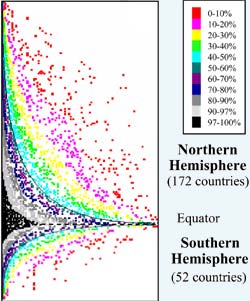Ecology drives the worldwide distribution of human diseases

Mounting evidence suggests that ecological and climatic conditions influence the emergence, spread, and recurrence of infectious diseases. Global climate change is likely to aggravate climate-sensitive diseases in unpredictable ways.
Increasingly, public health programs aimed at preventing and controlling disease outbreaks are considering aspects of the ecology of infectious diseases–how hosts, vectors, and parasites interact with each other and their environment. The hope is that by understanding how ecological factors impact the global distribution of parasitic and infectious diseases, public health officials can predict and contain future outbreaks.
Even though parasitic and infectious organisms account for a major fraction of the biological diversity on the planet, few studies have analyzed the factors affecting the spatial distribution of these organisms or attempted to quantify their contribution to biodiversity. In this issue, Vanina Guernier, Michael Hochberg, and Jean-Francois Guegan address the influence of ecological factors on the biological diversity and distribution of parasitic and infectious diseases. After compiling epidemiological data on 332 different human pathogens across 224 countries, Guernier et al. used sophisticated statistical modeling methods to identify and characterize the influence of a number of potential contributing factors on species richness. They found that climatic factors are the most important determinant of the global distribution of human pathogens.
The finding has important implications for predicting and managing future infectious disease outbreaks. These results counter the conventional assumption that socioeconomic conditions are the most important factor in controlling disease, indicating that global climate change could have far more significant effects on global patterns of disease, with diseases once relegated to the tropics migrating to temperate zones, for example. Identifying the links between ecology and disease, however, could lay the foundation for effective preventive strategies.
Citation: Guernier V, Hochberg ME, Guegan J-F (2004) Ecology drives the worldwide distribution of human diseases. PLoS Biol 2(6):e141. DOI: 10.1371/journal.pbio.0020141.
CONTACT:
Vanina Guernier
IRD
Unite de Genetique des Maladies Infectieuses
Montpellier, France
33-0-4-6741-6205
guernier@mpl.ird.fr
Media Contact
All latest news from the category: Health and Medicine
This subject area encompasses research and studies in the field of human medicine.
Among the wide-ranging list of topics covered here are anesthesiology, anatomy, surgery, human genetics, hygiene and environmental medicine, internal medicine, neurology, pharmacology, physiology, urology and dental medicine.
Newest articles

High-energy-density aqueous battery based on halogen multi-electron transfer
Traditional non-aqueous lithium-ion batteries have a high energy density, but their safety is compromised due to the flammable organic electrolytes they utilize. Aqueous batteries use water as the solvent for…

First-ever combined heart pump and pig kidney transplant
…gives new hope to patient with terminal illness. Surgeons at NYU Langone Health performed the first-ever combined mechanical heart pump and gene-edited pig kidney transplant surgery in a 54-year-old woman…

Biophysics: Testing how well biomarkers work
LMU researchers have developed a method to determine how reliably target proteins can be labeled using super-resolution fluorescence microscopy. Modern microscopy techniques make it possible to examine the inner workings…





















